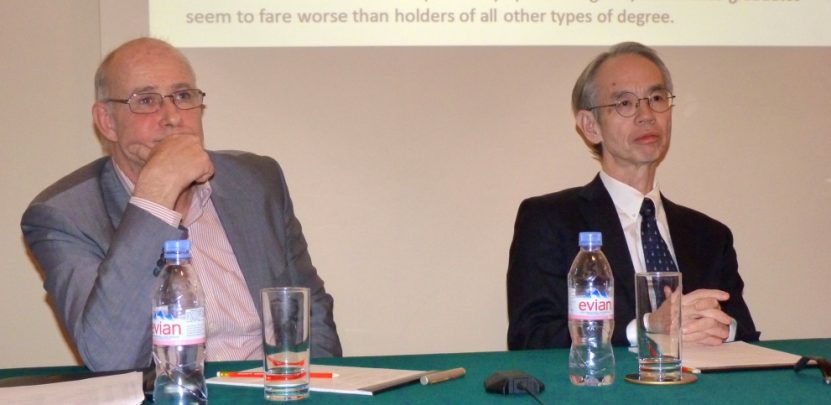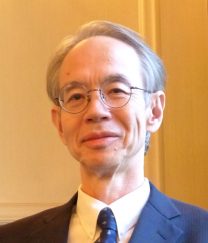 Seminar Series 2013
Seminar Series 2013Thursday 28 March 2013
6:00pm – 7:30pm
Shifting Values in Higher Education
13-14 Cornwall Terrace, London, NW1 4QP
Organised by The Daiwa Anglo-Japanese Foundation
In both Japan and the UK, university graduates face intense difficulties finding high-quality employment. In Japan, increasing numbers of young people are classified as ‘freeters’ (people who move frequently between low-paid casual jobs), NEETs (“Not in Education, Employment, or Training”), or hikikomori (young people who have withdrawn from society altogether). In the UK, the trebling of university tuition fees and the associated rise in student indebtedness has added to the pressure for higher education to provide clear routes to employment. But shouldn’t universities also have a broader mission to help students realise their full potential as human beings? Where does the new focus on employability leave the traditional ‘liberal arts’ education? In difficult economic times, the balance may be shifting.
This talk was the first in our 2013 Series: “The Search for Contentment: Shifting Values in the UK and Japan.”
Professor Naoyuki Agawa, the first speaker, is a leading commentator on Japanese higher education, and a Vice-President at Keio University. He set out to talk about the Japanese university sector, while considering how Japan can improve its education system in order to make it more competitive. The current younger generation is faced with enormous challenges and tasks, said Agawa, as Japan is going through fundamental changes and uncertainties affecting its economy, and is having to deal with security threats posed by the dispute with China over the Senkaku Islands and the rise of China and globalisation in general.
Japan also has the fastest ageing society. In this respect, Agawa said ruefully, it is number one, ahead of everybody else. China and Korea’s populations are also ageing, but Japan’s population is, more fundamentally, shrinking. It will lose 30 to 40% of its population by 2055. At the moment 20% of its population is 65 and above, this will rise to 40% by 2050.
Agawa went on to say that Japan has been a fairly stable successful country with many achievements despite its mistaken military incursions in the last century. It has also succeeded in achieving a fairly stable society mainly composed of ethnic Japanese. For all the talk about new minorities in Japan, they account for, at most, 2% of the population. It is necessary to think about the lack of diversity in Japan said Agawa.
Showing a picture of the current Abe Cabinet, Agawa pointed out that other than two female ministers, all are men, dressed in formal attire. It is difficult to tell them apart as they are all ethnic Japanese and dressed identically. Pictures of the British and Singaporean Cabinets demonstrate plenty of diversity and the Obama Cabinet is as varied as could be expected.
Japan has been unable to diversity and change itself, regretted Agawa. When necessary it has been able to confront enormous challenges such as Chinese influence in the seventh and eighth centuries, the adoption of Christianity and guns in the sixteenth century as a result of Spanish and Portuguese incursions – Christianity was soon dropped, guns weren’t – and Commodore Perry’s arrival in 1853.
Yukichi Fukuzawa (1835-1901) was a Japanese samurai and the founder of Keio University in 1853. Showing remarkable flexibility, he adapted to the opening of Japan by the West by adopting western clothes and western thinking on education. He espoused the importance of being different from others, and western optimism. Here lay the roots of the success of modern Japan suggested Agawa.
Today, said Agawa, Japan may be regarded as not having been successful in education. Student mobility across national borders has increased over the last 30 to 50 years, and, looking globally, four times more students are studying abroad than 30 years ago. Most of these students are now Chinese. American students move abroad quite a lot while the number of Japanese studying abroad has significantly dropped, having peaked at 83,000 in 2004. The number is now 60,000. Agawa wondered why this is happening and commented on the fact that Japanese people perceive this to be a crisis situation given the backdrop of an ageing society, the fact that the world is getting smaller and that the Japanese have to compete within and outside Japan against talented Europeans, Chinese and Americans. In response to this situation Japanese students need to be better trained and educated, and the Japanese government is urging universities to encourage students to be more outward-looking. Agawa himself hopes that the Japanese will begin studying abroad once again and encourages students to see the world. “Is globalisation a good thing or not? Is it an end in itself?” he wondered.
The University of Tokyo has proposed shifting the start of the academic year from April to September, as that would make it easier for Japanese students to study abroad in the summer months. At the moment the April term ends in late July, which makes it too late for them to enter summer schools in Europe or the USA. There is enormous resistance to this suggestion by other universities in Japan as they are comfortable with the academic year as it is.
Japanese businesses are becoming irritated by the fact that Japanese universities are still very traditional and not teaching practical skills. The most important task for universities, said Agawa, is not to work out how to become globally competitive, but how to create young people who have the ability to think creatively in order to cope with a world which is uncertain and whose future is unpredictable.
Ending on an upbeat note, Agawa confidently said that with that ability, students in Japan will be able to compete globally.
Professor Andy Green, the second speaker, is an expert in the comparative study of education and training systems, and spoke about Higher Education and the global crisis for youth. He set out to look at the real conditions to which universities and their value systems need to adapt.
These are tough times for university students and graduates, claimed Green, probably tougher than currently acknowledged in public debate, referring to rapidly declining job opportunities, stagnant graduate incomes, unaffordable housing, rising unemployment and paying higher contributions and working longer for smaller pensions. In many European nations, young people face poorer prospects than their parents did. This is a very unusual situation said Green, which hasn’t been seen for about a century.
Young people have been hardest hit because employers have stopped recruiting, part-time and temporary workers are the first to go, and older workers are readier to accept shorter working hours and reduced pay in order to hold onto their jobs. Moreover, older employees are working longer and in the more desirable jobs for graduates. Recent evidence shows that over half of all new jobs are going to those aged 55 and older.
There has been a huge increase in the supply of skilled graduates, including a large number from China. We have also seen changes in the nature of graduate work as a result of technological advances and the tendency to ‘digital Taylorism’, commented Green, leading to the routinisation of many graduate jobs, including the work of bank managers and that related to medical diagnoses. Many skilled jobs are also being outsourced to cheaper countries, including China.
An expectation of many American and British graduates, which has been fostered by their governments, is the idea that if you remain very highly skilled it is possible to outsmart other countries and remain competitive. This idea is a little less plausible than it used to be now that there is increasing cost competition and employment prospects are tough.
Changes in the housing market are also hitting the young, the result of housing bubbles that have affected Japan, the UK, China and Singapore among other countries. Housing has been a major vehicle of asset advancement for two generations and if that disappears, this will have a huge impact on students and the young warned Green.
An important aspect of social mobility has to do with aspiration and quality of life. Something major has changed in this respect in that the young can no longer aim for this ambition.
Turning to how universities in the UK have responded, Green said that they have been squeezed and seen declining enrolments, especially at postgraduate level. Facing shortfalls in terms of research income, they are being forced to rely on charging higher fees. While public spending on Higher Education has been reduced, Higher Education fees have risen to between £8,000 and £9,000 a year. Green doesn’t think this will have a huge impact in the UK, only affecting students who have no money to spare, as graduates still have better prospects than those who don’t go into Higher Education.
In terms of wage returns, there is less variation in countries which have low income inequality, such as the Nordic nations, while variation is higher in countries which have more wage disparity such as in Southern Europe and English-speaking countries. In the UK, it is clear that there is more diversity in wage premia by type of university and courses. Graduates from universities with higher reputations tend to do better, and some courses result in better paid graduates as well. Quite a few graduates are now overqualified in their jobs. This tends to happen more in fields related to ‘services’, ‘agriculture and vet’ and ‘social sciences and business’. Over-qualification, to which universities haven’t fully responded yet, tends to be less prevalent in systems which have more occupationally-focused degrees.
Universities should aim to give students the best skills and chances possible, which will probably result in a change in the types of courses and work opportunities they provide, suggested Green.
The issue of how to raise social mobility, ended Green, is largely a matter of macro policy and not education.
The lively and varied questions and comments which followed the talks included further probing about ‘shifting values’ in Higher Education. The main shift, rather than being in terms of humanistic values, replied Green, is that being made in the face of economic pressures such as efficiency drives and increased globalisation and recruitment of foreign students. Beyond that, universities are responding to student demands and becoming more vocational. Agawa agreed, saying that in Japan, private universities are doing their utmost to attract foreign, especially Asian students, and are improving as a result and providing more competition for the more established universities. The prevalence of online courses, predicted by some to result in an avalanche for the sector, was also touched on, though Agawa rejected the move to online courses and insisted that he didn’t want universities to veer away from their original mission which is to create independent-minded graduates who excel in skills and have broad minds – for public rather than individual knowledge. Green agreed that there is a proliferation of online courses especially in the United States, and that this will remain a huge phenomenon as Higher Education costs are not going to get any cheaper. The UK hasn’t yet worked out how to respond to this development said Green. Commenting on what is to be done to redress the deficiency in English speaking in Japan, Agawa said that Japanese people won’t be speaking fluent English in 150 years as Japanese people, similar to the British, are insular and not predisposed to mastering foreign languages, the difference being that everyone speaks English, so the aim is to get at least 2% of the Japanese to speak good English. Touching on the issue of the dumbing down of education, Green pragmatically answered that of course universities and education have changed with the increased number of university students, but that he would not recommend reverting back to a time when only 10% were going to university. The issue was raised of international students being courted by universities for their money but then not being looked after properly as clients , along with the fact that many young people are not getting university places despite good exam results, and are finding university too expensive.
About the contributors

Professor Naoyuki Agawa
Professor Naoyuki Agawa graduated from the School of Foreign Service (SFS), Georgetown University, in 1977, after transferring from Keio University. Upon graduation, he joined Sony in Tokyo. While at Sony, he read law at the Georgetown University Law Center, graduating in 1984. He joined the law firm of Gibson, Dunn & Crutcher in 1987 and worked for its Washington, D.C. and Tokyo offices until 1995. Continuing to practise law with Nishimura & Partners in Tokyo, he joined Keio University in 1999, as a professor of American Constitutional Law and History. He was appointed Minister for Public Affairs at the Embassy of Japan in Washington, D.C. in August 2002 and served there until he returned to Keio in April 2005. He was Dean of the Faculty of Policy Management at Keio University Shonan Fujisawa Campus between 2007 and 2009 and is currently Vice President of Keio University. His books include, among others, The Birth of an American Lawyer, The Friendship on the Sea: the United States Navy and the Japan Maritime Self-Defense Force, American History through the United States Constitution (for which he received the Yomiuri-Yoshino Sakuzo Award in 2005). Professor Agawa is also a co-translator into Japanese of Paul Johnson’s A History of the Jews and he frequently contributes to various academic journals, opinion magazines and newspapers

Professor Andy Green
Professor Andy Green is Professor of Comparative Social Science in the Department Lifelong and Comparative Education at the London Institute of Education. He is also Director of ESRC Centre for Learning and Life Chances in Knowledge Economies and Societies (LLAKES). His main field of research is the comparative (historical and sociological) study of education and training systems, their origins and social and economic consequences. He has a long-standing interest in education and state formation and has researched both European and East Asian education systems. His publications include Education, Equality and Social Cohesion: A Comparative Analysis (co-author, Palgrave Macmillan 2006); Regimes of Social Cohesion Societies and the Crisis of Globalization (co-author, Palgrave Macmillan, 2011) and ‘Lifelong Learning, Equality and Social Cohesion’, European Journal of Education (2011). He is academician of the Academy of Social Sciences and a member of the Board of Governors of the National Institute of Economic and Social Research (NIESR). Additionally, he is an editorial board member of Comparative and International Education Review, Globalization, Societies and Education and the Journal of Education and Work, amongst others.